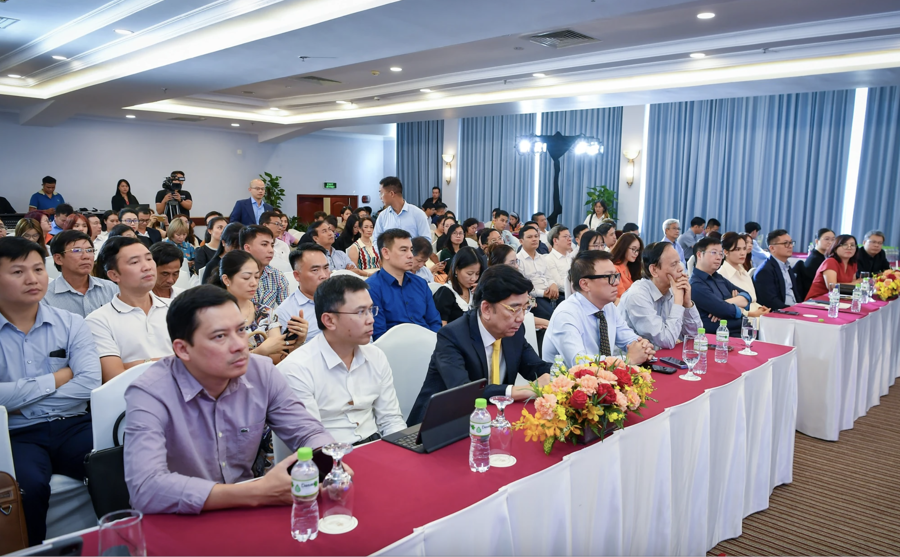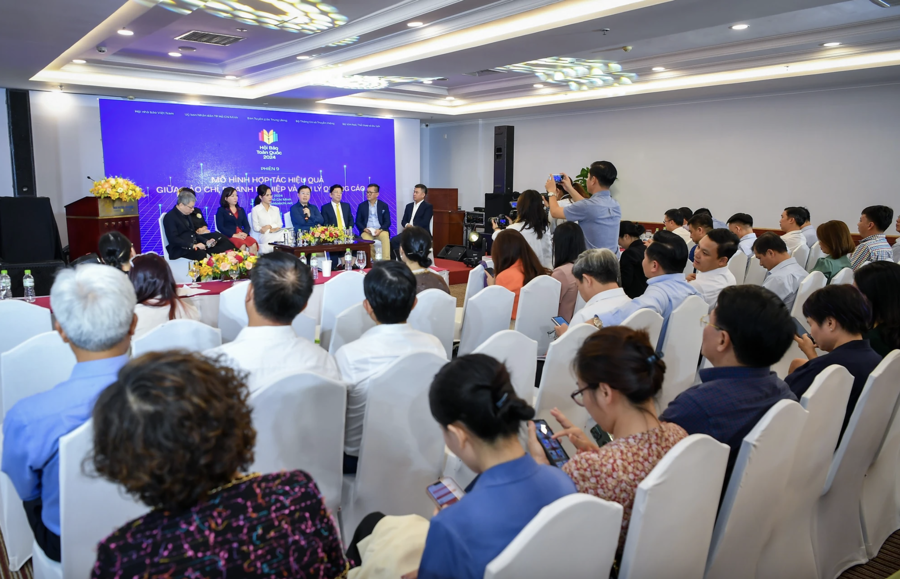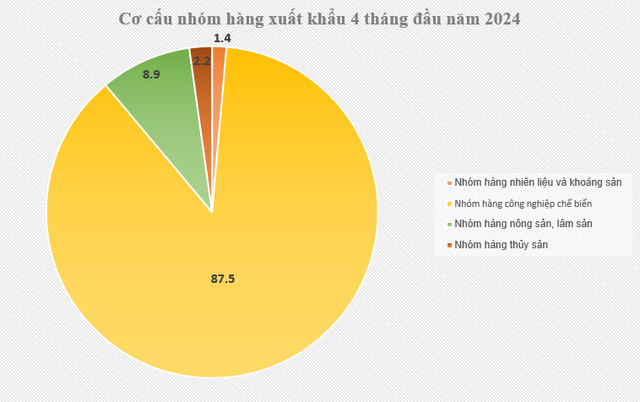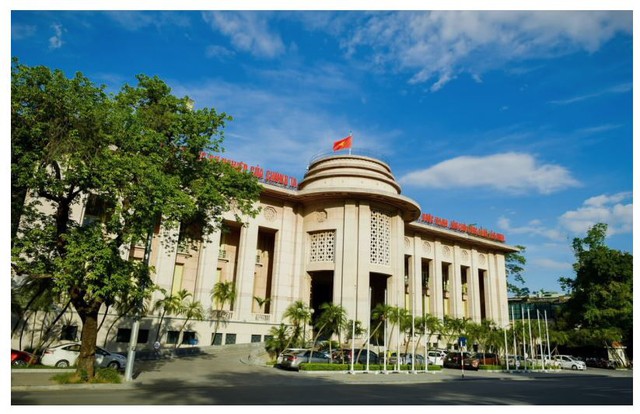The discussion session on the topic “Efficient collaboration model between media, businesses, and advertising agencies” took place on the afternoon of March 16th, as part of the National Media Forum 2024, with contributions from representatives of media agencies, businesses, and advertising agencies.
Participating in the discussion session were Mr. Le Quoc Minh, Central Party Committee Member, Editor-in-chief of Nhan Dan newspaper, Deputy Head of the Central Propaganda Department, and Chairman of the Vietnam Journalists Association; Mr. Nguyen Thanh Lam, Deputy Minister of Information and Communications; Mr. Tong Van Thanh, Head of the Press and Publishing Department of the Central Propaganda Department; as well as leaders of several units under the Ministry of Information and Communications, and representatives of media agencies, businesses, and advertising agencies in the country.
In his speech at the discussion session, Mr. Nguyen Thanh Lam, Deputy Minister of Information and Communications, emphasized the important role of this forum in reshaping the relationship between the media and businesses. “We still need each other, now and in the future, but the way we collaborate, the objectives and expectations of each party when coming together have changed,” Mr. Lam shared.
For a long time, the media has been seen simply as a channel for introducing products and services, but that is no longer the strength of the media. In the movement of society and new media trends, change is inevitable. Both parties need to find each other’s deficiencies and compensate for them with different forms of collaboration, not just a relationship of “bothering each other” or “one side considering the other more important.”

Deputy Minister of Information and Communications Nguyen Thanh Lam further shared that, from the perspective of state management, in meetings and exchanges, many local businesses have stated that they have been bothered by some media agencies or journalists, and this has greatly reduced recently. He expressed his joy that the media industry has gradually entered a more professional and responsible mode of operation. However, it is also necessary to review whether the relationship between the media and businesses is just a relationship of “bothering each other.” If the media is only seen as an advertising channel for products and services, and as a nuisance, this relationship will be very shaky. Society and the world all need responsible media, and the media alone cannot accomplish this task.
“The media is not a place to show off one’s abilities, it is not a place for writers to lead, to show their knowledge or tell readers what to think. Journalists nowadays must listen more, understand more, and tell human stories, stories with real experiences. All of this requires a higher level of expertise from journalists, and the role of the media is further reinforced,” he added.
RECHANNELING THE ADVERTISING MONEY IN THE ONLINE SPACE
“In the process of management, we have realized that the money in the online space coming from advertising services of businesses is facing problems, being dominated by communication theories, numbers, and algorithms that deem views important, regardless of what the view is and its quality,” Deputy Minister Lam said.
Many unjust beneficiaries have arisen from that economic sector and ecosystem, which is detrimental to advertisers. The social responsibility of businesses is not only to offer good products and services to society but also to choose responsible communication methods. The media budget should not be used to reward nonsensical content or content that violates the law, while legitimate content suffers from a lack of resources.

Rechanneling the advertising money in the online space should be done towards clean and responsible channels that are authentic and capable of intervention. Channels that violate the law, are limited politically and legally, infringing copyright, and lack cultural standards, all these channels should have their advertising money cut off by businesses.
To accomplish this, there must be a large enough number of safe and clean channels for businesses to allocate advertising budgets at a reasonable cost. Bad channels that are not suitable for society, with improper content, must be eliminated, with no money to sustain their operations. Recent efforts by some government management agencies have shown that we can definitely do this.
SPREADING THE POWER OF RESPONSIBLE CONTENT
According to journalist Nguyen Ba, Editor-in-chief of Vietnamnet newspaper, the current situation in the press is that about 65% is news and 35% is in-depth content. In that 35%, there are two types of content that outperforms others and receives great attention from readers.
Firstly, there is the inspiring content,
Secondly, there is sustainable content. Sustainability can refer to the environment, but it can also refer to sustainable relationships.
“We consider this to be responsible content,” Mr. Ba shared. These contents may not have a large number of views or be sensational, but they are sustainable contents that readers are looking for. In the context where AI is increasingly being applied in journalism, there is one thing that AI cannot do immediately, and that is to evoke emotions in articles.
Agreeing with this viewpoint, journalist Le Quoc Vinh proposed a solution to the collaboration problem between the media and businesses in spreading responsible content. Collaboration here is not just a matter of “I support,” but businesses can use their financial resources to support and participate in these contents. Businesses may not immediately solve economic objectives when investing in these activities, but the positive results will be evident.
Mr. Nguyen Khoa My, Chairman of the Vietnam PR Network (VNPR), shared that building trust is a goal that most businesses are striving for. This trust is not necessarily related to promoting their brands but rather to the communication choices they make responsibly. We cannot allow media funds to be used to pay for efforts to create nonsensical and illegal content, while legitimate content suffers from a lack of resources.
DIFFERENTIATING RESPONSIBLE MEDIA CHANNELS
There is a significant difference between traditional media agencies and new media channels. An observable fact is that a considerable amount of money from businesses is being channeled to foreign media channels beyond Vietnam’s borders. These media channels, in reality, do not care whether the media is responsible or not. So, how can businesses differentiate responsible and suitable media channels to reduce support for untrustworthy media channels?
Answering this question, Mr. Le Quang Tu Do, Deputy Director of the Broadcasting, Television, and Electronic Information Department (Ministry of Information and Communications), assessed the current relationship between the media, businesses, and advertising agencies as seemingly increasingly fragmented, with each party having its own issues.
For the media, the problem lies in still living in the “past glory”. Ten years ago and before that, the media held a dominant position, and it only felt threatened when social media emerged. However, despite the threat, the reaction of most media outlets is just to “complain.” One example illustrating this reality is a survey on the level of digital transformation maturity conducted by the Ministry of Information and Communications in 2023, which found that only 3.66% of media agencies demonstrated excellent maturity, while as much as 63% showed poor maturity. In the context where modern media relies more and more on technology, the volume of content and readers has been distributed to social media platforms. Media cannot expect brands and advertising agencies to invest without making any effort themselves.
For brands, the issue they face is the trend of chasing key performance indicators (KPIs) for views, without determining which views are good or bad. Approximately 43% of views on social media are wasted views, but brands do not care about that, and they throw advertising money to obtain those views. Meanwhile, by allocating around 10% of the advertising budget that goes towards the 43% of wasted views to improve brand safety and the quality of views, the effectiveness of communication will undoubtedly increase significantly.
For advertising agencies, a major weakness is that they focus on chasing the KPIs set by brands and are afraid to persuade brands on what constitutes good advertising.
“The visible reality is that we have not met each other’s expectations, leading to a declining relationship. In the past 10 years, especially in the past 5 years, this relationship has invisibly declined, resulting in the fact that whichever content has the most views will survive and thrive. This has led to a trend where content creators produce content that attracts views, and the easiest way to attract views is to create harmful and nonsensical content. The Ministry of Information and Communications is running a campaign with the message of creating clean and healthy content, and we hope to receive the support of brands for this campaign,” Deputy Minister Lam said.





































